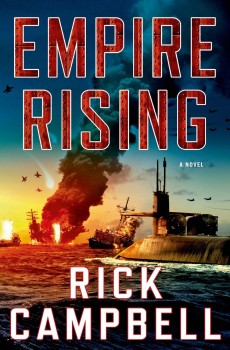Empire Rising by Rick Campbell
 By Dan Levy
By Dan Levy
For many writers, the seemingly sage, “Write what you know” can be a double-edged sword. Some are leery to go through the emotional proctological exam it takes to discover what they know. Others are either bored with, or downright sick of, what they know: that’s why they write.
Then, there are authors like Rick Campbell.
After twenty-five years in the Navy, having served on four different nuclear-powered submarines, Campbell began . . . writing what he knows.
We had the chance to talk with the retired Navy Commander, via email, to learn about how he put what he knows on the page, the challenges of knowing too much, and how to keep reality from getting in the way of good storytelling. An edited version of that conversation is below.
You’re clearly accomplished in your military career. What drew you to writing?
I had a story rolling around inside my head for twenty years, and I thought it would make a great movie. However, I didn’t know the first thing about writing a screenplay, nor did I have any contacts in Hollywood. So I thought that if I wrote a book and the right person read it, I’d have a shot. I wrote what I loved and no one else loved it, so I decided to write what I know. And what was that? Submarines.
It seems that if you’re going to write about submarine warfare, you have to go up against The Hunt for Red October. Would you talk a bit about how that made breaking into this sub-genre difficult for you? How did The Hunt for Red October help you if at all?
The Hunt for Red October (is) the gold standard when it comes to submarine thrillers. So when I decided to write one, I started with Clancy’s book, trying to figure out what made it so successful. To begin with, it has a brilliant plot. I explored what a plot would look like if you pulled it into the twenty-first century, and then reversed it. However, I wanted my books to be realistic, and my assessment was that the Russian Navy, which is a shell of the former Soviet Navy, does not have the capability to locate one of our submarines in the middle of the Atlantic Ocean. I was stuck; I had a basic plot idea, but the sad fact was, the only navy in the world that could hunt down an American ballistic missile submarine was the United States Navy. Ding!
Considering your history, you’re clearly in a position to draw from your experience for story, theme, detail etc. Can that also be a curse at times? Can you know too much?
Absolutely. A crucial element in thrillers is pacing, but in a military thriller you have to explain the ship, tactical system, and weapon capabilities so the reader can visualize the scene and understand what’s going on. Too much detail bogs the story down, and too little leaves the reader confused. (As the author) I’m often too close to the problem, because what is obvious to me isn’t obvious to some readers, and it’s sometimes difficult to identify when I haven’t included enough detail.
Where is the line between what you can talk about in your books and what you can’t?
There are several scenes in each book that are not technically accurate, because having the characters respond as they would in real life would reveal classified operational protocols. The same with weapon systems, in terms of speed, range, and other capabilities. I tweak them so no one can reverse engineer those capabilities from the scenarios in my books.
In writing either of your first two books, have you had real-life experiences that you think are too unreal/unbelievable for fiction?
When it comes to whether real-life experiences are too unbelievable for fiction, the short answer is yes. What I’ve learned is that some things that make sense to those trained in submarine warfare do not make sense to the general public.
Who is the primary protagonist of EMPIRE RISING? What made this character’s perspective the best to tell the story?
The main protagonist in EMPIRE RISING is Christine O’Connor, which is unusual for a military thriller. She’s a normal, untrained woman as opposed to the spies, ex-CIA agents, or Special Forces types who normally carry the load in espionage and military thrillers. I went one step further and decided to go with an ordinary woman who simply ends up in the wrong place at the wrong time and has to deal with the situation as best possible. It definitely makes it a challenge to develop plausible plots where she can play a lead role, because she has no special skills, but it also provides a change of pace from other spy and military thrillers. If Christine ends up in a physical confrontation with an average man, instead of prevailing due to her training, experience, strength or dexterity, she gets the snot kicked out of her.
What do you like most about Christine O’Connor? What surprised you about her as she came to life on the page?
What surprised me most about Christine O’Connor was that she survived The Trident Deception (Campbell’s debut novel). In the original version, she died, along with all of the main characters. I decided I wanted to write a sequel, and that’s hard to do if all of your characters are dead. So I picked two characters to move forward with, and Christine ended up being a good choice, because of the four main characters in The Trident Deception, Christine has been the favorite of most readers.
There’s so much in the news about oil and China. Clearly you have a perspective that is new or hasn’t been covered. Can you talk a bit about what makes your book unique?
Shortly after I started writing EMPIRE RISING, two novels with the same theme were published, much to my chagrin. However, Bond and Clancy/Graney’s books end with the United States thwarting China’s ambitions and preventing the outbreak of full-scale war. EMPIRE RISING is far different, in that full-scale war breaks out, and China is much better prepared than anyone expected, crippling the United States Pacific Fleet. EMPIRE RISING is about how the United States recovers and wins the war, rather than preventing it.
Is there a scene or chapter in EMPIRE RISING that is a favorite or that is especially poignant for you? Why?
My favorite scene in EMPIRE RISING is probably the Prologue, in that it is very different from the rest of the book and a bit unexpected considering the plot. The goal of the prologue is to convince the reader to keep reading, but I wanted to do something unusual, and ended up with a Chinese wedding scene. I don’t know how well it accomplishes the objective, but I really like it.
While I don’t want to skip over EMPIRE RISING, what do your fans have to look forward to in your third book? Can you give us a little insight?
Cold Betrayal involves a collision between the newest American fast attack submarine and one of Russia’s new ballistic missile submarines. As life support systems aboard the submarines begin to fail, the United States and Russia rush to the aid of their crews. Both sides realize that whoever reaches the sunken ships first will be able to board the other country’s submarine, harvesting the latest weapon and tactical system technology.
Which authors influence and inform your work?
When I started out, I worked for a year and a half with an agent, learning how to write, and she mailed me a few books and gave me a reading list of what to study, and they were all espionage novels. So my books, although very much in the submarine and military thriller genre, have an espionage feel to them in both plot and style.
What’s one piece of advice that has served you well since you started writing? Is it be the same advice you’d give to aspiring authors today?
One piece of advice that sticks in my mind is from my editor. I was talking with him about an early review on my first book, where the reader pointed out four plot holes, and the reader was dead wrong. I figured readers would understand that since I served on four nuclear-powered submarines, I’m an expert on this type of stuff, and take it at face value that this is how we do things. My editor replied with an excellent comment – “Real life doesn’t need to make sense. Fiction does.”
Any final thoughts or last comments on being a mystery/thriller writer that you’d like to share?
To writers aspiring for a traditional book deal, my assessment is you need three things: a good manuscript, perseverance, and good luck. Unfortunately, you have no control of the last, but essential element. Keep writing good manuscripts and you’ll eventually get it onto the desk of the right agent and editor, at the right time.
On his last submarine tour, Campbell served in a position where his permission was required before any of the submarine’s nuclear-tipped missiles could be launched. When he says he’s writing what he knows, you can take his word for it.
*****
 Rick Campbell, a retired Navy Commander, spent more than twenty-five years in the Navy, serving on four nuclear-powered submarines, finishing his career with tours in the Pentagon and in the Washington Navy Yard. On his last submarine, he was one of the two men whose permission is required to launch the submarine’s nuclear warhead-tipped missiles.
Rick Campbell, a retired Navy Commander, spent more than twenty-five years in the Navy, serving on four nuclear-powered submarines, finishing his career with tours in the Pentagon and in the Washington Navy Yard. On his last submarine, he was one of the two men whose permission is required to launch the submarine’s nuclear warhead-tipped missiles.
Upon retirement from the Navy, Rick tried his hand at writing and was offered a two-book deal (which has been extended to a four-book deal) by Macmillan / St. Martin’s Press for his novel – The Trident Deception, which has been hailed by Booklist as “The best submarine novel since Tom Clancy’s classic – The Hunt for Red October”. Rick lives with his wife and three children in the greater Washington, D.C. area, and is working on the third and fourth books in this series, sequels to The Trident Deception (2014) and Empire Rising (2015), due out in 2016 and 2017.
To learn more about Rick, please visit his website.
- City Dark by Roger A. Canaff - September 30, 2022
- Time’s Relative by Debbie De Louise - June 30, 2021
- The Vigilant Spy by Jeffrey Layton - June 5, 2020
